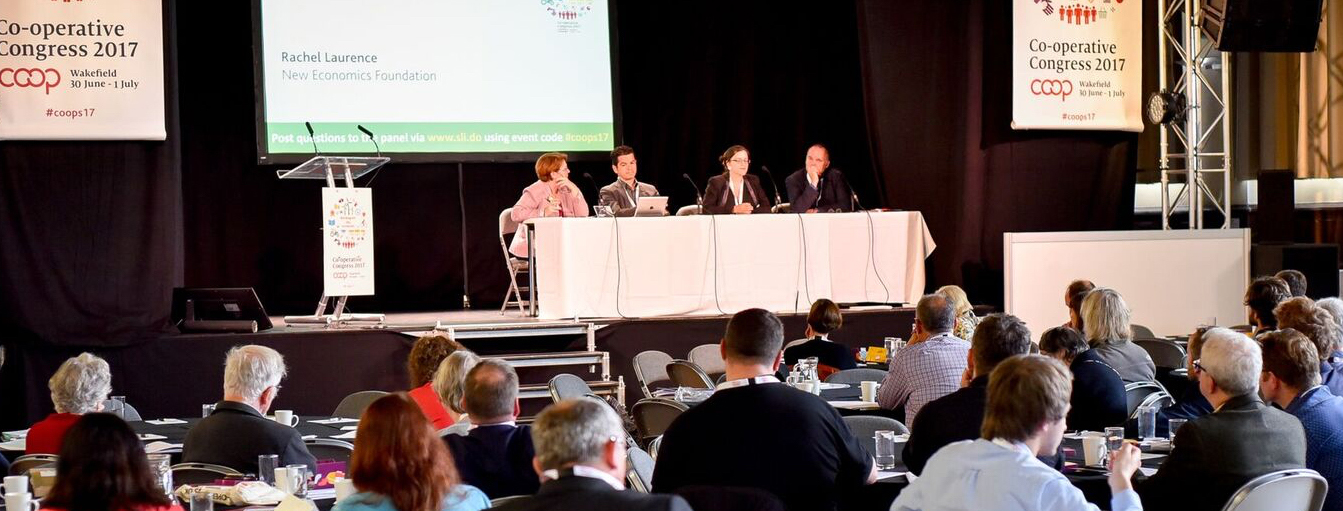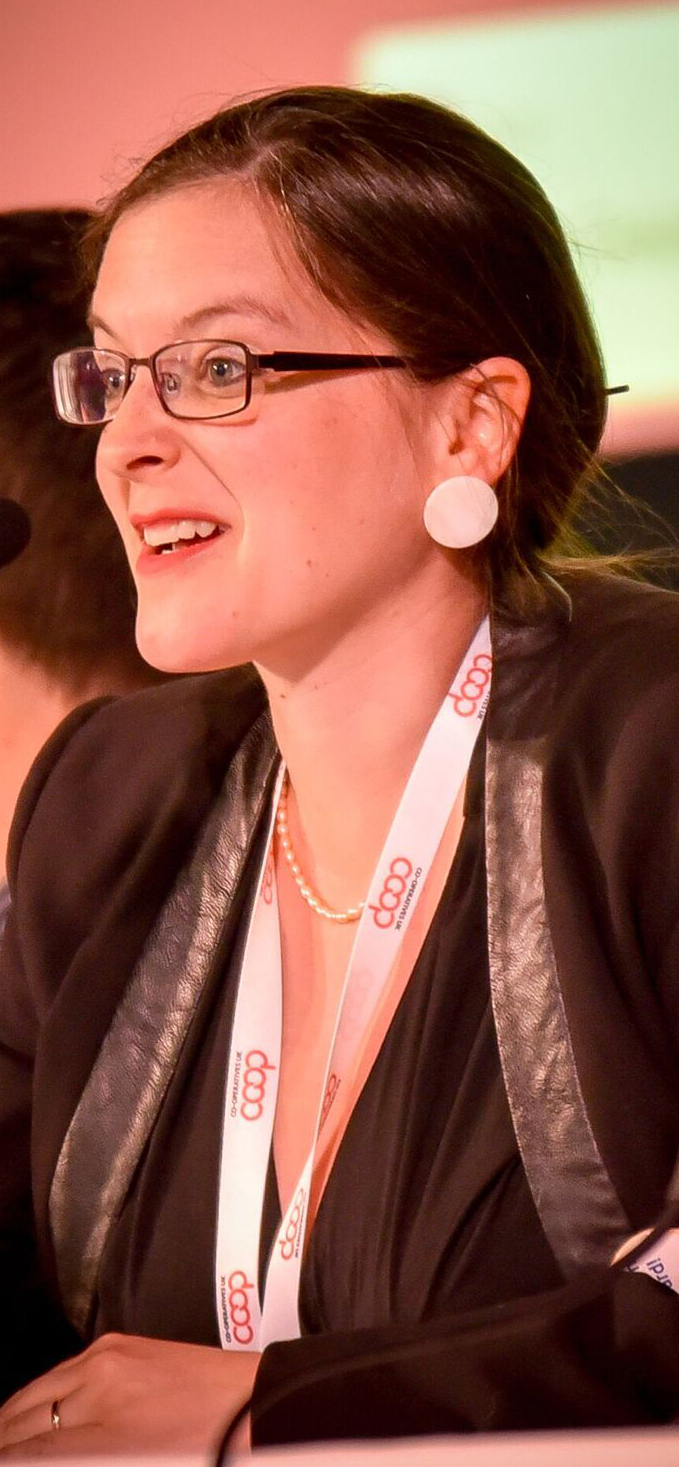With the UK economy tied into an unproductive economy and consumer debt, communities left powerless by a planning system, and the wider world facing technological advances that threaten a rise in unemployment, changes are needed to deliver “inclusive growth”, delegates at Co-operative Congress heard.
Baroness Thornton chaired a session on Reimagining the Economy, with panelists Andy Wightman MSP, from the Scottish Greens, Rachel Laurence from New Economics Foundation, and Ibon Zugasti of Mondragon.
Andy Wightman said the UK faced problems that other countries have avoided because of its structure of land ownership – and he called for more common ownership of land to correct this.
“A lot of this revolves around where you live,” he said. “I live in Edinburgh – after the financial crash, a lot of land in Edinburgh was left empty. Its owners are in the British Virgin Islands. It’s unacceptable for that land to lie empty.
“The quadrupling of land prices over the last quarter of a century has boosted house prices – which means the UK is an unproductive economy because a lot of it tied up in unproductive assets.”
But in Germany, which has a different land ownership structure, property prices have not changed since 1970s – which means money “is invested in real jobs in the real economy”.
Mr Wightman said the UK needs a new approach to how it taxes land to reshape an economy currently built on personal debt and consumption. In Scotland, the response is to take land into common ownership. He gave the example of the Isle of Eigg, which is celebrating 20 years of common ownership, and is now self-sufficient in terms of energy.

As an MSP, he is pushing for legal, fiscal and political changes – for instance, via a bill in Scotland to give private tenants greater security of tenure and tackle short-term lets.
Read more: Actor Michael Sheen on co-ops and building a fairer economy
“Land owners rely on the emergency services and infrastructure to safeguard their property – and ultimately the armed forces to defend that land – so they should have an obligation to pay tax,” he added.
Rachel Laurence (NEF) also took aim at the planning process, which she says has left poor communities disempowered.

She gave the example of Collyhurst, an estate in Manchester with high levels of unemployment and personal debt, where locals had joined together to try to reshape their community.
With new housing being built in the area for young professionals moving to Manchester as the city grows, the locals saw the opportunity to create businesses – such as shops, cafes and hairdressers – to serve them, and approached NEF and Co-operatives UK for help.
But the planning process meant all commercial units in Collyhurst were due to be demolished, with no replacements to be built.
“There was new wealth coming in which would push up house prices,” said Ms Laurence. “It meant there was an opportunity to tap into wealth but no infrastructure to do it, and no local labour clauses to make sure locals got jobs in construction and so on.”
She spoke to Manchester City Council and asked it to rethink its policy. The council said it was too late to fix the problem – but said it would take such issues into consideration in future.
“It’s a really interesting story where a council is being pushed to generate growth,” she said. “Manchester has to raise growth in a certain amount of time – so you have to import labour to build new housing stock, you can’t wait to generate those skills locally.
Related: Co-op News Big Debate on communities in crisis
“It’s something I see repeated across the UK. Rather than starting with the assets and people you’ve got, and how you deal with economic opportunities around them, instead you look at the sectors you develop which can generate that growth.”
This leads to the problems of gentrification. Ms Laurence says one figure from the city council told her: “We understand the housing stock we have is not attractive to the kind of people we want to live and work in Manchester.”
There is a limit to what can be done to achieve to mitigate the negative impact this has on local communities, for instance through redistribution, she warns.
“You just end up sinking a lot of energy with your left hand that you’re creating with your right. So how do you structure your economy?”
Instead, there should be a move to inclusive growth, a shifting of ownership structures, and a rethinking of supply chains, she said. “The financial services sector is not the sector which can do this,” she added. “Social care is good, construction can be good.
“The challenge is how do you make that happen, and how do you make that happen in a bottom-up way? It won’t happen in the corridors of power that we have. How, if you live in Collyhurst, do you pull the levers of change to reshape the industrial strategy?”
She suggests finding middle ground between small achievable projects that generate excitement on the ground but don’t spark systemic change, and “big think-pieces” that don’t work on the ground.
Taking a global view of the economic challenges facing the world, Ibon Zugasti of Mondragon discussed how his organisation was working to be “profitable, competitive and tech-driven to create new jobs in a global economy”.

He said global co-op principles were key to success in this – but long-term planning was also vital.
“We’re transforming the business fabric – we’ve had difficult times in the past few years, so thinking of our future, we’re asking, which of our businesses have the potential to grow?”
Mondragon has drawn up a future innovation strategy tying together the business’s internal agents; technological innovation; and higher education.
It is looking at promising areas like construction and technology but also care services related to health, wellbeing, ageing, which offer an opportunity for co-ops to grow.
And it is contributing to the Millennium Project – a global network, backed by the UN, looking at the future of work and technology.
Related: Congress debates communities and how assets can be put to work
With crowing inequality of income and wealth, jobless growth becoming the norm, return on investment and capital outstripping return on labour; and automation taking jobs, the outlook is bleak with the possibility of social turmoil unless action is taken.
Research is now being taken into the global scenario for the year 2050, with national institutions and businesses, which will be taken to the UN.
“If we do nothing, some countries will be able to cope but most will not,” he warned, adding that co-op values were a vital part of any solution, especially for people in self-employment.
Baroness Thornton said: “The fact that the Mondragon continues to innovate and find new ways of tackling social problems is very interesting. And the UK co-op movement is currently reinventing itself and becoming a much younger movement.”
She said this was driven by the desire of young people to create a more sustainable society, adding: “It’s very optimistic and it’s very exciting”.
Andy Wightman said: “Another big challenge is climate change – but democracy is at the heart of things. My answer to everything is democratise it. Representative democracy in the UK is not very good.
“Barcelona is doing amazing things because it has the power to do amazing things – our municipalities do not.”
Rachel Laurence agreed on the need for: “Much better democracy, much better solidarity.
“The problem with localism is it would leave the south wealthier than the north, in the UK; it creates the danger of individualism. But the co-op movement is one of the most usueful tools to show what we mean by solidarity.”
And Ibon Zugasti added: “Those countries performing better in the long term – they have their problems but these are countries that have long-term vision and strategy and they are investing in those paths for long term success. Short-term tools takes you to distortions in the economy and society.”